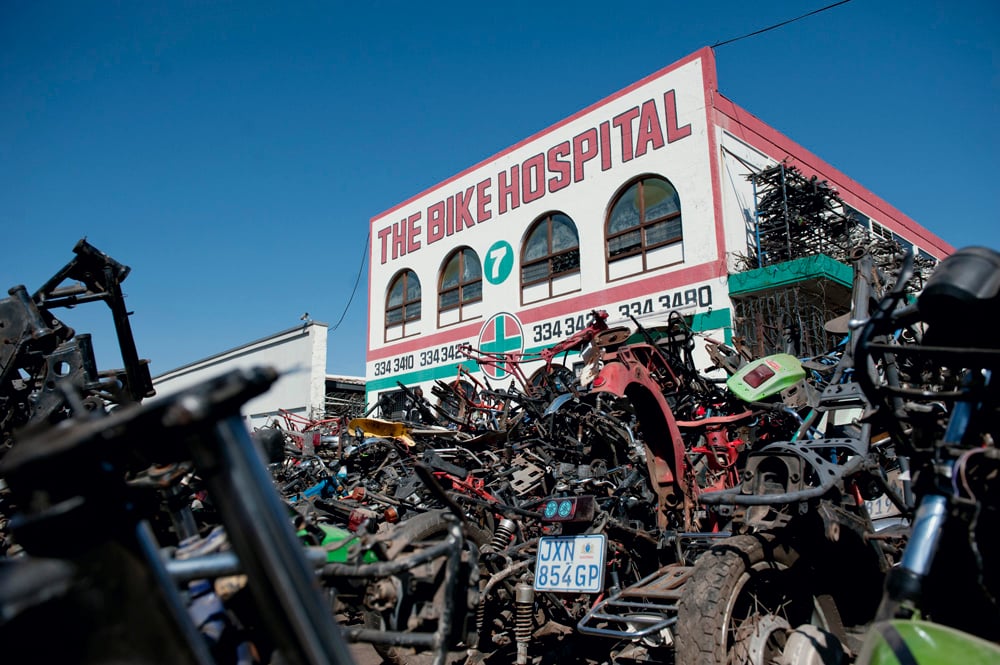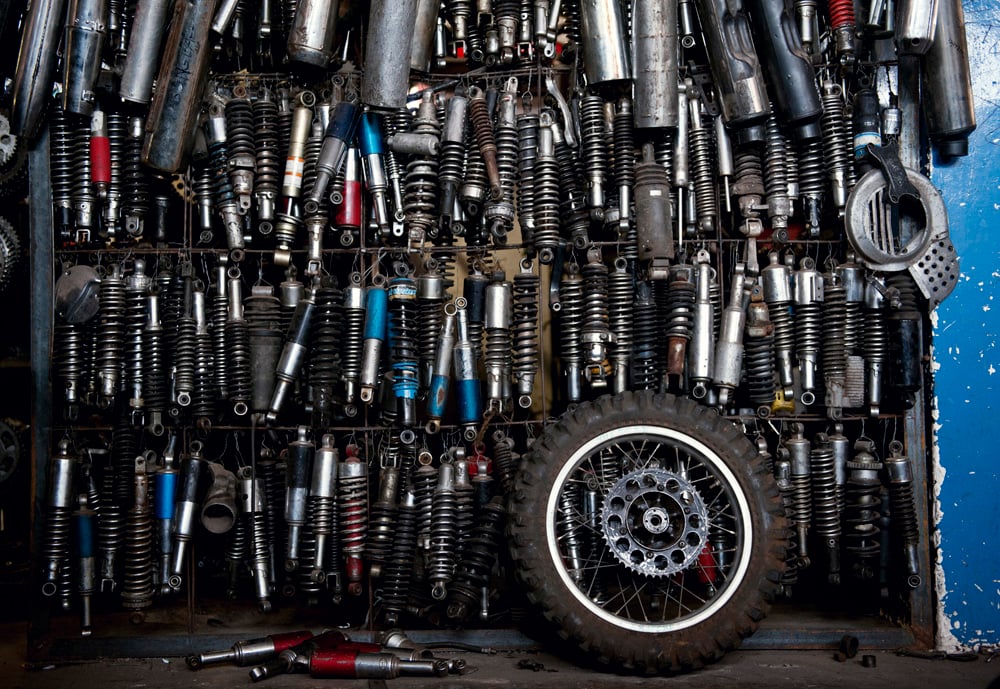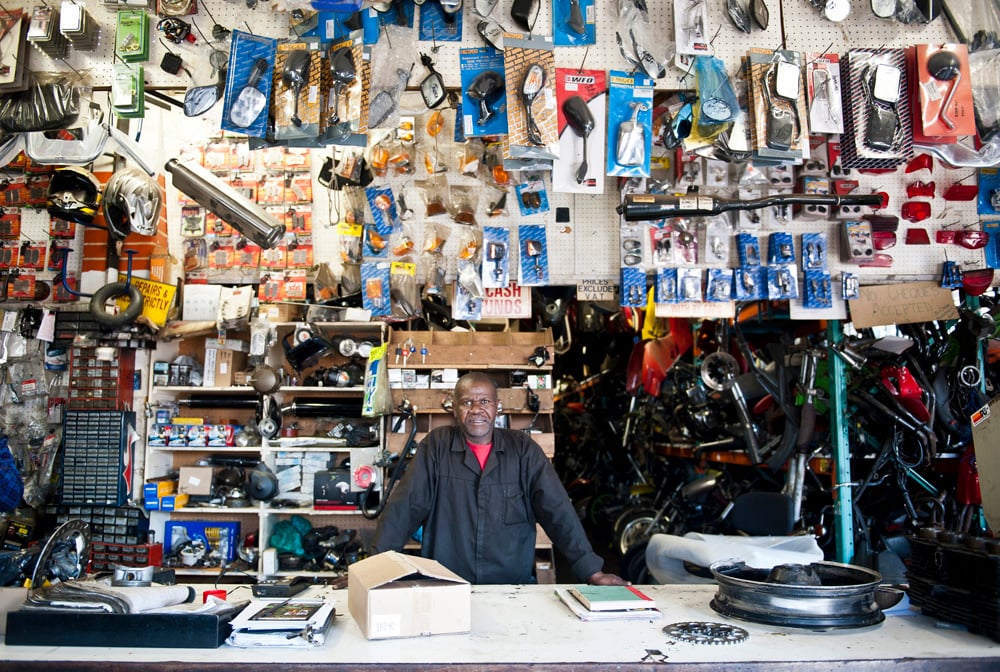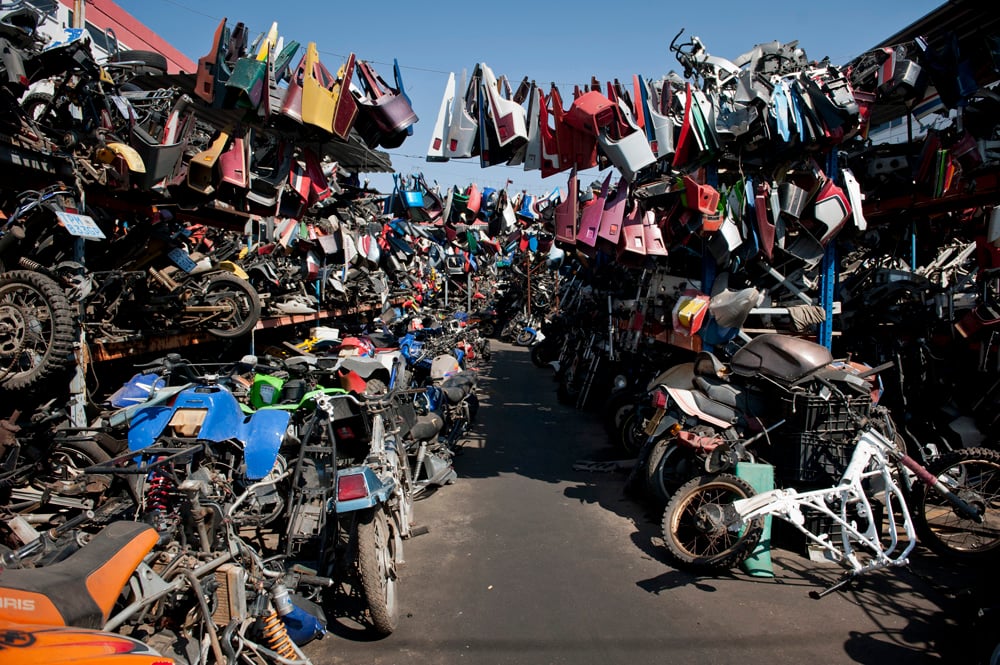Life begins at 240km an hour, Errol Coetzee says – and, when you’re living that life on the back of a motorbike, someone’s going to get you.
That’s exactly what happened two months ago when Coetzee, the owner of downtown Johannesburg’s Bike Hospital, was riding his Kawasaki ZX12 at 201km/h on the N1 north highway. “There’s a moment when you go over 200km/h and the wind resistance gets going and all you know is that bike. So there I was going and suddenly I check there’s an accident ahead of me,” he said last week.
It wasn’t an accident: the police had closed the highway and stopped the traffic to catch him. They threw him in jail for the night and he went to court the following week.
He says he’s surprised he can even go that fast, considering he’s two metres tall and has the aerodynamics “of a brick”. He’s smoking in the sun in the yard of his shop and, with his black clothes, boots and shoulder-length hair, he looks as if he stepped off the set of Sons of Anarchy.
He’s vice-president of the south chapter of the Crusaders Motorcycle Club and the tattoo on his right forearm confirms his loyalty: “CFFC”, which stands for “Crusaders forever, forever Crusaders”.
‘Just cool’ tattoos
He lifts his T-shirt to show me the rest of his tattoos. What do the Native American faces and wolf-face tattoos on his right shoulder mean to him?
“No, I don’t know,” he laughs loudly. “It’s just cool.”
He’s 45 and you can tell he’s spent a lot of time in the sun.
All around him is the metal that makes up the Bike Hospital. It’s the biggest seller of new and used motorbike parts in the southern hemisphere, he says. It’s no small claim, but this is no small place.

The Bike Hospital is the biggest seller of new and used motorbike parts in the southern hemisphere, says Coetzee. (Photos: Madelene Cronjé, M&G)
In an era of mass commercialisation, chain stores and a waste economy, the combination of Coetzee’s hoarder tendencies and his vast collection of specialist and general parts is keeping the biker market alive.
Sprawling at the end of End Street and in the armpit of the M2 and the M31, this is about 1 500m2 of biking nirvana: several million motorcycle parts that make up a hobbyist’s heaven. It sells pretty much everything but specialises in superbikes and “old-school stuff”.
Another day in the office
It’s a Tuesday and there is a row of men behind the counter at reception, attending to customers. Some are on the phone, others are shouting for parts and one is revving a bike in everyone’s faces. The customers range from a Nando’s delivery guy to a cop.
A sign at the till tells visitors that the people who work here are bikers and if you’re coming here to bother them, then you can “fuck off”.
Behind the men are about six racks of bike parts so long, they disappear into darkness. Like bats, employees emerge from the shop’s belly every few minutes, holding tools and parts for customers.
Coetzee takes me on a grand tour and it starts in this cave.
We walk past tens of thousands of rear shocks, fairing panels and cylinder heads packed in cardboard boxes and crates stacked on metal racks or hanging from hooks on the ceiling. They spill into the narrow walkways and block out the already dim lights. We step over oil stains and puddles on the concrete floor. You can’t see the windows.
Up some stairs and we’re in another room with rotors and rims, crankshafts and calipers. So many rims: about a million of them, Coetzee estimates.
Now we’re on a walkway leading out the back of the room, with chicken wire separating us from the sky “to hang things on”, Coetzee says.
Blurred lines
The lines between old trash and parts get more and more blurry the deeper we go. There’s no real system even for cataloguing what comes in, he says. The business buys whatever people want to sell, bikes that have been in accidents and the contents of closed-down bike shops.
“But working here for so many years, you get to know a thing,” he says, running his hand over bunches of handlebar switches hanging over a balustrade like rotten vines.

Coetzee’s hoarder tendencies and his vast collection of specialist and general parts is keeping the biker market alive.
We stop at the workshop at the back of the yard, which is also the petrol-smelling home of some of Coetzee’s 13 “bike babies”.
“That’s a Z1R, that’s a MKII, there’s a ZX12R … it’s very rare.”
He’s trying to collect the whole “Ninja range” of superbikes.
Dead things
Now we’re outside the workshop and in the central yard: all around us are dead things. Dusty and rusty, they look like scrap to an untrained eye. But to Coetzee they are alive and restless, just waiting to be put back on the road again.
“Whatever comes in here … the aim is to fix it up, sell it and get it back on the road,” Coetzee said.
“We want to keep bikes alive … we want to keep biking alive.”
There’s good money to be had in this business, too.
He nudges an old four-wheeler with his boot. It might have been bought for R5 000, he says, but its parts could sell for about R15 000.
Business takeover
The business opened in 1983 on Anderson Street and, in 1995, the then owners bought the current premises, which at the time was a door factory. Coetzee was already an employee by then, but only took over the running of the business 12 years ago and now owns it with 35-year-old Shaun Krugel and a third, silent, partner.
Durban-bred Coetzee started riding motorbikes at age 11 when his stepfather threw him the keys to one and said: “Ride.”
He only plucked up the courage to take his feet off the ground when he noticed a girl from school watching him from the window of the house across the street.

Elias Dube doesn’t think all the parts at the Bike Hospital will get used up in his lifetime.
When he was 15, he dropped out of school and hitchhiked to Jo’burg. His mom was living in Hillbrow and his sister was working at Boobs, the nightclub.
He got his first taste of the biker life from resident biker gang the Demon Brothers and, through them, he met the owners of the Bike Hospital.
His passion is his profit now, but it comes with its penalties too.
Space constraints
Space is the biggest problem at the Bike Hospital. When there was none of it left to pack the incoming parts and bikes next to each other, the piles just went up towards the sky, moved on to the wide window ledges and into containers on the other side of the road.
Coetzee won’t throw anything out without spending some quality time with it first. “If it isn’t sold, doesn’t have registration papers and isn’t rare, then it’s scrapped,” he says.
He does a sweep of the place about four times a year and sends a few tonnes to the scrapyard.
I have to ask him: But what do you really think you’re going to do with these millions of parts? “Sell them.”
I’m not convinced, so I ask his partner Krugel the same question, to which he gives me the same answer.
“We just don’t have time to sort it all out right now,” he says.
‘Befuck’ prices
He’s wearing sweat pants, and has gelled hair and grease on his hands. He’s not much of a biker and is more into cars, but can see the value in a rare bike.
“This 1980 50cc was bought back then for R500 but if you go on the internet, you’ll see okes will buy it for R60 000 … it’s befuck.”
He says their customers are “everyone” from policemen to “ANC guys”.
“The whole of Soweto knows me.”

The Bike Hospital sells pretty much everything, but specialises in superbikes and ‘old-school stuff’.
I follow Elias Dube (50) down the rows back to the workshop. He has fixed and built bikes at the yard since 1988 “when I was young, and now my beard is fucking grey”, he says and laughs the raspiest laugh.
We talk about the music of the place: the revving, hammering, winding and staff shouting for each other over the geography of the racks and piles, and against the hum of the highway and angle grinders from nearby workshops. The wind blows off the M31 and shakes the hanging mudguards like wind chimes.It’s eerie in the quieter corners.
Ghost bikes
Dube says he won’t come here at night. If there are ghosts attached to the bikes that were in accidents, he’s not interested to know about them.
I ask him the same question I asked Coetzee and Krugel, but his answer is different. “Me, I will retire and the place will still look like this.”
He has to go. There are customers waiting.
Watch the slideshow at mg.co.za/bikehospital.